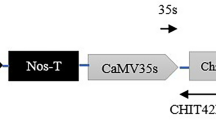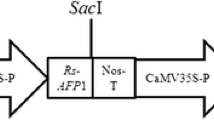Abstract
An acidic endochitinase gene (pcht28) isolated from Lycopersicon chilense was introduced into tomato (L. esculentum) through Agrobacterium-mediated transformation, using the CAMV 35S promoter. Transgenic plants demonstrated a high level of constitutive expression of pcht28 and chitinase enzyme activity. Kanamycin-resistant R1 plants (resulting from self-pollination of transgenic plants) as well as R2 plants were evaluated for their tolerance to Verticillium dahliae (race 1 and 2 for R1 plants and race 2 for R2 plants) in the greenhouse. They demonstrated a significantly (P<0.05) higher level of tolerance to the fungi compared to the nontransgenic plants, as measured by foliar disease symptoms, vascular discoloration, and vascular discoloration index. The transgenic plants produced in this study represent a source of genetic resistance to Verticillium dahliae.
Similar content being viewed by others
Author information
Authors and Affiliations
Additional information
Received: 18 August 1998 / Revision received: 22 March 1999 / Accepted: 14 April 1999
Rights and permissions
About this article
Cite this article
Tabaeizadeh, Z., Agharbaoui, Z., Harrak, H. et al. Transgenic tomato plants expressing a Lycopersicon chilense chitinase gene demonstrate improved resistance to Verticillium dahliae race 2. Plant Cell Reports 19, 197–202 (1999). https://doi.org/10.1007/s002990050733
Issue Date:
DOI: https://doi.org/10.1007/s002990050733




